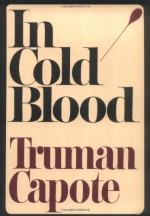|
This section contains 568 words (approx. 2 pages at 300 words per page) |

|
Dualism in Truman Capote's in Cold Blood
Summary: This essay analyzes the prevalent theme of dualism in Capote's non-fiction novel "In Cold Blood," and discusses the various points of view necessary to create Capote's desired effect upon the reader.
To fully understand the purpose of In Cold Blood, one must explore Capote's strategy in writing such a tale. In his "In Cold Blood," Capote raises the possibility of rational order without ever fully endorsing it, often revealing that random and accidental events shape the history of the crime. Because of this, we as readers cannot pinpoint one exact reason for the incidents that occurred at the Clutter house that fateful night, and are forced to sympathize with two opposing characters within the story, Perry Smith and Alvin Dewey.
Capote's narrative method also emphasizes two language systems--the first based on punishment, the second on psychological analysis of personality-- that demonstrate opposing ways of judging human behavior, thus making it impossible for one to judge the killers or the novel from one specific viewpoint. This example, and the example regarding two channels for reader sympathy, illustrates the theme of...
|
This section contains 568 words (approx. 2 pages at 300 words per page) |

|


